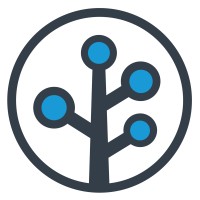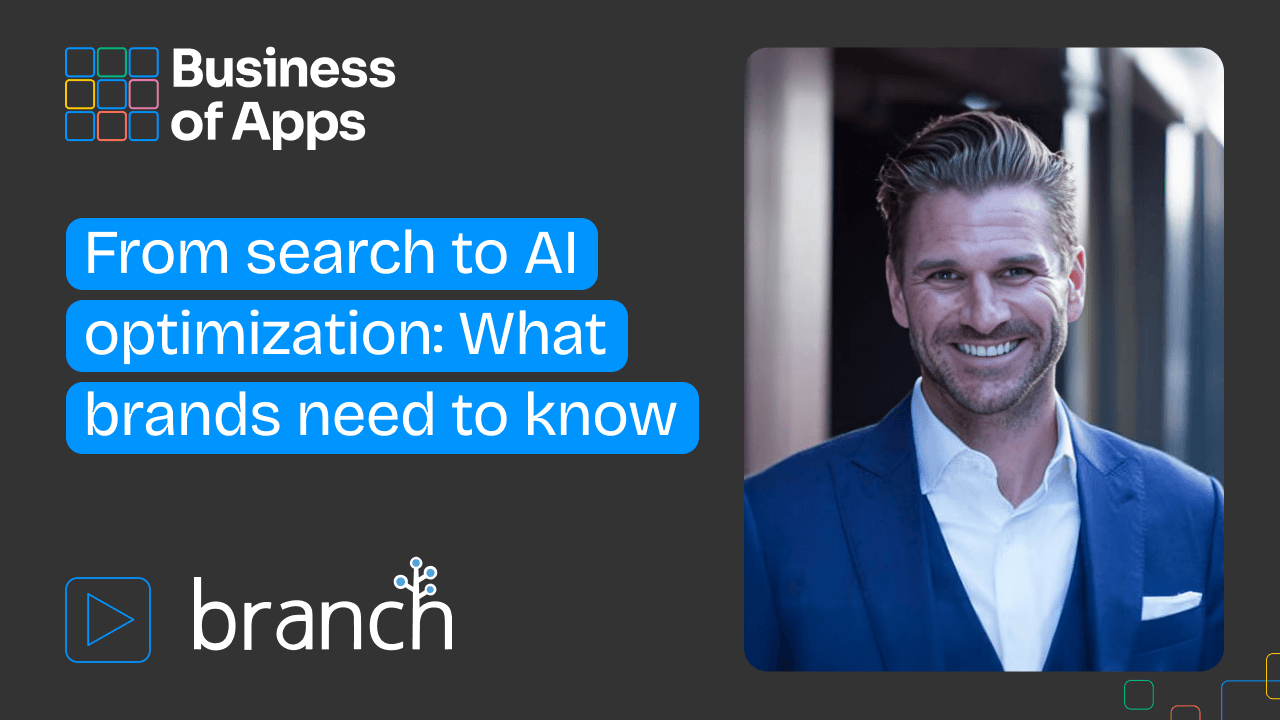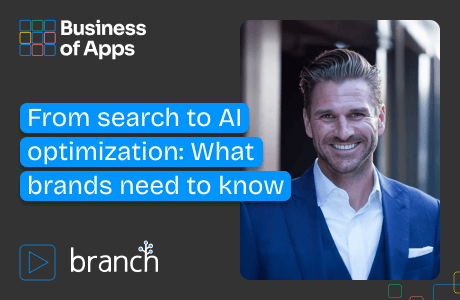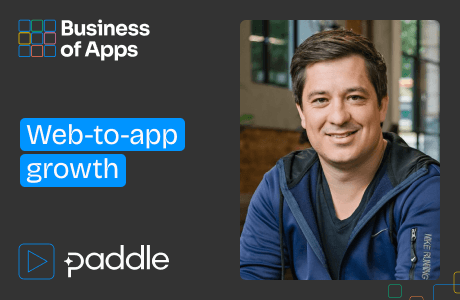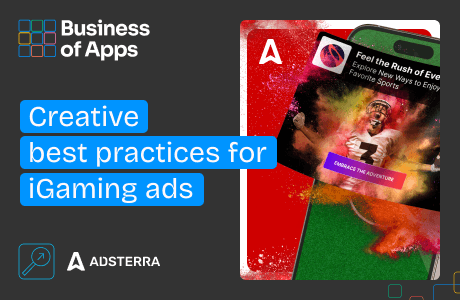Search Engine Optimization (SEO) has dominated digital marketing strategies for two decades, but a fundamental shift is rewriting the rules of user discovery.
The era of generalized search results is ending, replaced by personalized AI that keeps users within AI boundaries rather than directing them to external websites.
In this episode of App Talk, we explored this transformation with Adam Landis, Strategic Advisor at Branch, who’s watching the systematic migration from search-dependent to AI-optimized marketing strategies. As 96% of marketers now use AI, Landis has found himself at the center of what he calls the shift from SEO to AIO, i.e. Artificial Intelligence Optimization.
Search is dead. Long live AI.
Remember when you’d Google “business of apps” and get the same results as everyone else? That’s over. AI doesn’t serve up generic lists. It crafts personalized answers using millions of data points about you. Your search history. Your preferences. Your context.
“Personalized artificial intelligence is simply artificial intelligence that uses user data to come up with an answer,” Landis explains. But there’s a kicker: AI doesn’t send users to your website. It keeps them locked inside its ecosystem.
Your beautiful landing pages? Irrelevant. Your SEO-optimized content? Potentially harmful if it conflicts with other information. AI aggregates everything and tosses contradictory data in the trash.
The companies winning this game are the ones feeding AI the clearest, most consistent information.
From search to AI optimization: What brands need to know
Source: App Promotion Summit
The Wikipedia hack
While everyone was busy building content marketing strategies, Wikipedia quietly and almost overnight became the most valuable brand on the internet.
“Wikipedia has actually enabled LLMs and AI to freely access its information,” Landis explained. “They’re constantly being able to update and provide relevant, fresh information.”
Wikipedia understands that in an AI-first world, being the source matters more than being the destination.
Meanwhile, entire industries are getting obliterated. Recipe blogs that buried instructions under life stories? Dead. “Made for advertising” sites that existed purely for affiliate clicks? Extinct.
The three-stage extinction event
Most companies don’t realize they’re about to become irrelevant. Landis breaks down the hierarchy:
Stage 1: You’re already obsolete
If you’re still thinking in terms of “driving traffic to your website,” you’re fighting the last war. AI doesn’t care about your website. It cares about your information.
Stage 2: You’re getting commoditized
If your content can be easily replicated or summarized, AI will replace you entirely. Why click through to your blog when ChatGPT can answer the question instantly?
Stage 3: You’re feeding your competitor
If you’re not controlling how AI accesses your information, you’re essentially training your replacement. Every piece of content you create becomes training data for systems that will make you unnecessary.
Simply put, the companies that survive this transition will be the ones with the most essential, frequently updated, impossible-to-replicate information.
Sam Altman’s affiliate model will kill performance marketing
Here’s where it gets really interesting. OpenAI is exploring affiliate models where ChatGPT gets paid for referrals. Imagine asking for product recommendations and getting responses that are literally optimized for AI revenue, not your needs.
“I could see a world where there are hyper-specific product recommendations that a brand is enabling,” Landis predicts. “Someday, brands will just be mailing products directly to a user based on AI outputs.”
And this isn’t just science fiction. It’s the logical conclusion of AI-first commerce. When AI has perfect information about your preferences, purchase history, and context, traditional advertising becomes noise.
Performance marketing as we know it dies. Replaced by AI-mediated commerce that’s so personalized it feels like telepathy.
The measurement crisis that’s hiding in plain sight
One of the problems with all this is that no one has any idea how to measure AI optimization. Traditional analytics are useless when users never leave the AI platform.
“There aren’t a lot of standards that we can rely on,” Landis says. “Standards are required in order to be able to provide measurement to scale.”
Some companies are trying to shoehorn existing analytics into AI interactions, but the fundamentals are all different. It’s like measuring radio effectiveness with television metrics.
The companies that crack AI measurement first will dominate. They’ll be able to optimize while everyone else is flying blind.
What does this all mean for marketers and everyone else?
The AI revolution is already here. And it’s not optional.
Companies that think they can wait and see are already losing. The game is moving too fast. The players are changing too quickly. The rules are being rewritten in real-time.
You can adapt now, or you can become irrelevant slowly, then all at once. The choice is yours. But the window is closing.
This interview is part of our ongoing App Talk series, where we dive deep into the strategies behind today’s most successful apps. Explore all our App Talk interviews here.

